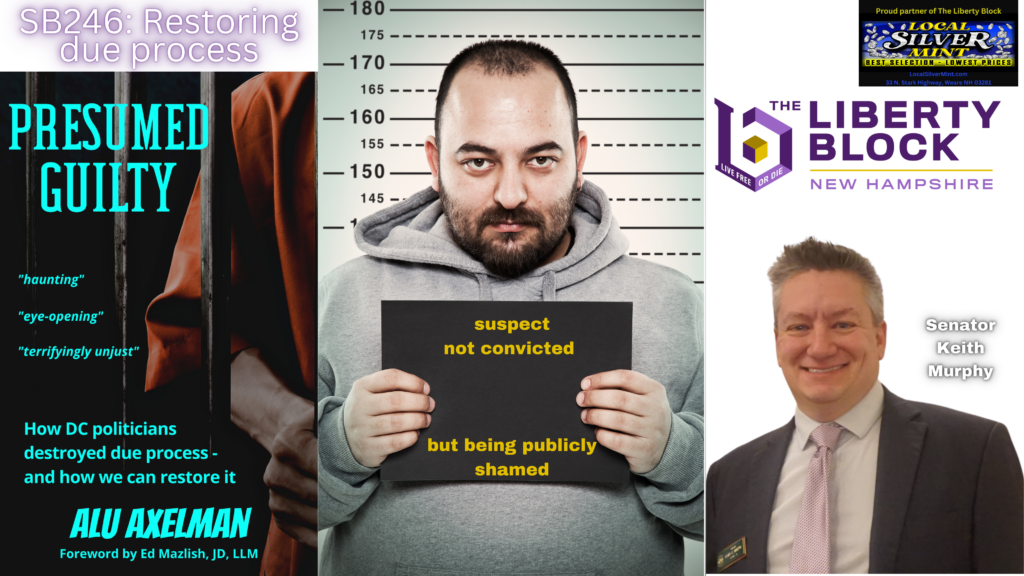Two Senators and Three Representatives have proposed legislation that would fix a common but little-known issue in the criminal justice system. As we all learned in grade school, we are supposed to be presumed innocent until proven guilty in a court of law after a fair trial. We are legally innocent until we are convicted unanimously by 12 of our peers. And being innocent means that we cannot be punished in any way by the government. Because the government can’t punish innocent suspects; only guilty criminals. The 5th amendment to the US Constitution guarantees this right.
We all know from TV and movies that when cops arrest suspects, they take a ‘mugshot’ of them. The police generally release the photo along with the age, gender, and offense that the suspect is charged with. The media often publishes these details, and the most significant cases can go viral. As you might imagine, this could be quite unpleasant for the suspect and could cause irreparable harm to their reputation, and therefore their lives.

As I explained in my book Presumed Guilty, the Supreme Court of the United States – the highest court in the union – has ruled that police departments can harm the reputations of suspects despite their innocence. In fact, the SCOTUS ruled in Paul v. Davis that it is not a due process violation and it is perfectly acceptable for government agents to publicly hang posters insinuating that suspects are criminals.
Proposed by Senator Keith Murphy (my senator and the most pro-liberty member of the chamber) Senate Bill 246 would significantly improve this situation and protect due process in a substantial way. The bill states that “Post-arrest photographs of arrested persons taken by a law enforcement officer shall be considered records compiled for investigatory purposes and shall not be considered governmental records subject to disclosure.” The bill makes exceptions for suspects who could pose a serious imminent threat to the public.
In 2021, California passed a law prohibiting police departments from publishing mugshots of suspects charged with non-violent crimes on social media. Also in 2021, Montana passed a law that charges “a clerking fee of $100 for the release of a booking photograph prior to the termination of criminal proceedings against the individual depicted in the photograph” and Utah passed a law prohibiting the release of any suspect’s photos prior to a conviction.
As explained by Mr. Chet A.I. Jeepetey, “Mug shots, however, can create a negative impression of the accused in the minds of decision-makers, even if they have not yet been convicted of a crime. This can make it harder for the accused to receive a fair trial, as the decision makers may be more likely to view them as guilty, and less likely to consider evidence in their favor…Additionally, mug shots can be used in ways that are not relevant to the case at hand. For example, a mugshot may be released to the media, even if the accused has not been convicted of a crime. This can lead to negative publicity and public shaming, which can harm the accused’s reputation and make it difficult for them to receive a fair trial.”
After the initial publication of this article, I spoke with a legal expert about the bill and asked what the opposition might be. He mentioned that preventing the media/citizen journalists from accessing public records such as arrest information and photos could violate freedom of the press. He mentioned that if the bill passed into law, it may be blocked or nullified by a court on those constitutional grounds, and that such a ruling might actually be the principled liberty position. I must admit that I had not seriously considered the first amendment implications of the bill, and this perspective has caused me to cool off my zealous support for the bill. Local libertarians and voluntaryists in New Hampshire seem to be split on this issue, and I fully support robust debate between principled and well-intentioned individuals, regardless of whether they grant more weight to the 1st or 5th amendment in this case. The liberty champions on Tuesday night’s Free Talk Live episode are so accustomed to being arrested for civil disobedience that they honestly could not understand why anyone would consider a mugshot to be harmful to their reputation. Outside of the small group of dedicated liberty activist, nearly everyone would be very displeased to see their mugshot on social media.
The bill had a public hearing in the Senate Judiciary Committee on Tuesday, February 21st at 1 PM in room 100 of the State House. Please email the committee and fill out the simple remote testimony form to show your support for the bill, and please ask your neighbors to do the same.
The Senate Judiciary Committee members are:
This article does not necessarily reflect the opinions of The Liberty Block or any of its members. We welcome all forms of serious feedback and debate.



1 Comment
Jonathan McCormick, Jr. · February 25, 2023 at 2:57 am
A fascinating set of testimonies!
The sponsor mentions the element of police “discretion” in “(3) The subject presents an immediate danger to the public and the release of the photograph is necessary for public safety.” That seems kinda sus to me, since I think discretion should be as limited as possible due to the potential for corruption. If I were on the committee, I would try to amend it to a more objective set of criteria OR require a judge to approve a mugshot disclosure due to a purported “immediate danger”.
Comments are closed.